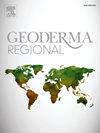墨西哥普埃布拉的农业梯田:人种学方法
IF 3.1
2区 农林科学
Q2 SOIL SCIENCE
引用次数: 0
摘要
梯田系统在不同文化背景下的农业发展中发挥了重要作用。这项技术具有多种益处,包括水土保持、提高土壤肥力、加强农业管理和提高作物产量。对中美洲的农业梯田进行了多项研究。然而,墨西哥缺乏对人为土壤的研究和人种学研究。本研究旨在确定当地的土壤知识,并描述墨西哥普埃布拉州南部一个 popoloca 社区的祖先梯田系统。对 10,366 公顷的区域进行了人种学调查,以确定土地类型和梯田系统。收集了地表梯田土壤样本,并对径流梯田内的九个土壤剖面进行了描述。目标如下1) 描述圣地亚哥阿卡特佩克的梯田系统特征,2) 了解当地的土地分类系统,3) 研究梯田系统对土壤形成和 WRB 分类的关系和影响。研究结果表明,梯田有两种类型(山坡梯田和径流梯田),面积达 2578 公顷。农民们认识到八种不同的地类,具有独特的特征和农业用途。这些地类既包括人为土壤,也包括天然土壤。这些地类被划分为赤红壤、优赤红壤、优赤红壤和裴利赤红壤。这些结果显示了农民对其土壤的详细了解以及梯田的优势和局限性。现代梯田和古代梯田按照七种不同类型的堤坝或围墙进行了分类。传统的堤坝被称为 "cuaxustles",与径流梯田有关,已知其寿命超过 100 年。修建梯田两年后,相关土地就可以用于农业耕作。传统的土壤知识使阿卡特佩克的农民能够建立新的农业区,选择适合该地区土壤条件和气候的作物,并对地貌进行长期改造。研究结果表明,在考虑经济因素和所涉时间框架的同时,实施以大规模土壤保持和改良为优先事项的环境改造是可行的。本文章由计算机程序翻译,如有差异,请以英文原文为准。
Agricultural terraces in Puebla, Mexico: An ethnopedological approach
Terrace systems have been instrumental in the evolution of agriculture across various cultural contexts. This technology offers several benefits, including soil and water conservation, improved soil fertility, enhanced agricultural management, and increased crop yields. Several studies have been conducted on agricultural terraces in Mesoamerica. Nevertheless, there has been a lack of research on anthropogenic soils and ethnopedological studies in Mexico. This study aimed to ascertain the local soil knowledge and describe the ancestral terrace systems within a popoloca community in southern Puebla, Mexico. An ethnopedological survey was conducted on a 10,366 ha area to determine the land types and terrace systems present. Surface terraced soil samples were collected, and nine soil profiles within runoff terraces were described. The objectives were as follows: 1) to characterize and describe terrace systems in Santiago Acatepec, 2) to understand the indigenous land classification system and 3) to study the relation and impact of terraces systems on soil formation and WRB classification. The results indicate two types of terraces (hillside and runoff terraces), covering 2578 ha of land. Farmers recognize eight distinct land classes, with unique characteristics and agricultural uses. The land classes encompass both anthropogenic and natural soils. These land classes are classified as Terric Anthrosols, Eutric Regosols, Eutric Leptosols, and Pellic Vertisols. These results show farmers' detailed knowledge about their soils and the advantages and limitations of terraces. The modern and ancient terraces were classified according to seven diverse types of embankments or walls. The traditional embankment, designated as “cuaxustles,” is associated with runoff terraces and is known to have a lifespan exceeding one hundred years. Following the construction of a terrace, the land in question can be cultivated for agricultural purposes after a period of two years. The traditional knowledge of the soil has enabled the farmers of Acatepec to establish new agricultural areas, select crops that are well-suited to the soil conditions and climate of the region, and implement long-term modifications to the landscape. The findings indicate that it is feasible to implement environmental modifications that prioritize soil conservation and enhancement on a significant scale while also considering economic factors and the time frame involved.
求助全文
通过发布文献求助,成功后即可免费获取论文全文。
去求助
来源期刊

Geoderma Regional
Agricultural and Biological Sciences-Soil Science
CiteScore
6.10
自引率
7.30%
发文量
122
审稿时长
76 days
期刊介绍:
Global issues require studies and solutions on national and regional levels. Geoderma Regional focuses on studies that increase understanding and advance our scientific knowledge of soils in all regions of the world. The journal embraces every aspect of soil science and welcomes reviews of regional progress.
 求助内容:
求助内容: 应助结果提醒方式:
应助结果提醒方式:


